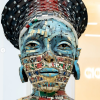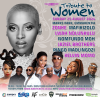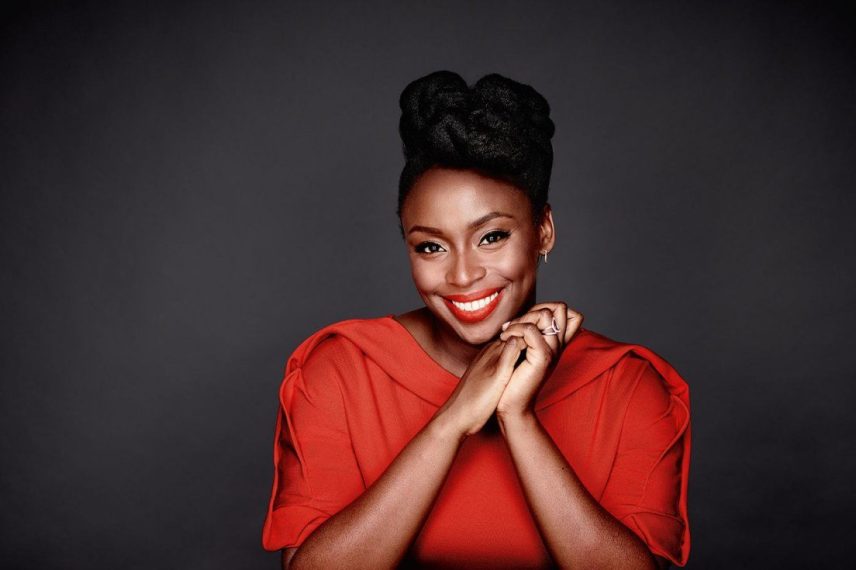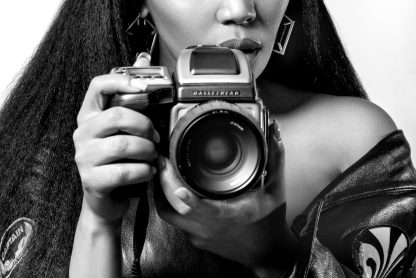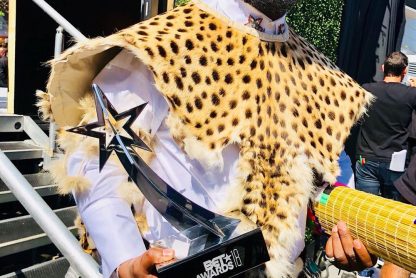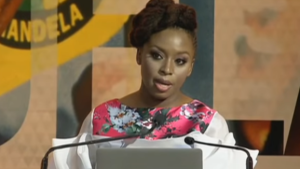 Renowned African author Chimamanda Ngozi Adichie graced South Africa with her visit and keynote address to commemorate Nelson Mandela at the Universtiy of South Africa.
Renowned African author Chimamanda Ngozi Adichie graced South Africa with her visit and keynote address to commemorate Nelson Mandela at the Universtiy of South Africa.
The author and political activist delivered her keynote address to thousands of people who gathered at UNISA on Thursday, 6 December 2018, in Ormonde, Johannesburg. This is part of her speech to South Africans:
“It has been more than ten years since I was last in South Africa. I visited twice, and both visits, I must say, were difficult for me; as a result, the prospect for me returning to South Africa did not appeal. It started with applying for a South African VISA, which on a Nigerian passport is a less than pleasant experience. If we, as Africans, cannot uphold to one another in a simple basic dignity in travel than we hardly have any basis for complaining when foreigners treat us badly. But the reason visiting South Africa was mostly difficult for me was that I did not know how to process the country. I grew up knowing how important the anti-apartheid struggle was; how committed Nigeria was to it. I knew South African academics had fled to Nigeria, and I knew that Nigeria supported the Arms struggle. I read books about South Africa. I listened to my parents castigate the foreign countries that refused to censor apartheid South Africa. I was familiar with the ability of a state to systematically brutalized its citizens. Nigeria, after all, had military dictatorships. But it was in many ways an equal opportunity assault to Nigeria; even the rich were not spared. But South African apartheid, in which it deliberately dehumanised in form of brutality was singularly focused on black people because they were black, completely confused me. From the books I read about South Africa certain images became the recurring motives of my imagination, the black maid in a white home, the black man being asked for his pass, the murdered child in the Soweto uprising. And some names took on a mythic significance: Mandela, Sisulu. I was in awe of ordinary black South Africans; I thought them so resilient, so courageous, and to top it all they all had a real hero, Nelson Mandela. And I felt benign envy, I wanted a Nigerian Mandela, a fiercely moral public figure, who still managed to be human. And so when I came to South Africa ten years after the fall of apartheid, it felt to me as though the past had not yet past but that there was a collective resolve to turn away from this truth. South Africans of all races spoke to me of a rainbow nation and I did not entirely trust this optimism- well choreographed as it was. It felt to me a little too easy. On a visit to Robin Island, a white man drive towards a small crowd and shouted something aggressive. We were told he was a former prison guard and he was angry that apartheid had been demolished. Now, this explanation was given in a tone of an excuse, as though it justified this man’s behaviour. And the Nigerian in me thought, ‘That’s rubbish and why can’t someone slap him and tell him to sit down.’ The point is that I did not understand the process by which South Africa was grappling with its past. I still do not. And perhaps I cannot because I am ill-equipped truly to understand. My framework is different. I think of my emotional politics as fiercely pan-African. I believe that the best measure for whether we care about something is how quick and how natural our instincts protect that thing is. And when it comes to the entire continent of Africa my sense of protectiveness is high. I care deeply about this continent. We are different and we are similar. Our pasts have battered us and emboldened us in different ways. To stand here, a Nigerian speaking of a centenary of the great Nelson Mandela birth is, in some way, a testament to Pan Africanism. Or perhaps not, because while Mandela was South African in every way, he seems now to be collectively owned by everyone in the world. Others, thankfully, engaged with what he was and what he did. Michelle Obama told me a few days ago at a public event in front of thousands of people that Nelson Mandela made Barak Obama possible. And I believe this to be true. Mandela was a South African and his struggles were uniquely South African, but it also sparked in people across the world a new vision of what is possible…
My father, who when I come to think of it was a Mandela-like figure in his simplicity and his grace, in his wisdom and in his ability to let things go. He told me that what mattered was that an apology had been made and so I had to forget whatever had been done to me. ‘But we haven’t talked it through,’ I said, ‘We must talk it through, I cannot just wave a magic wand and forget. It cannot be so unbearably, terribly tidy that this process of peacemaking. I knew that my father’s saint-like genes had, unfortunately, passed me by. I was human and I was angry. And I wanted my anger to be given its due. But I chose not to push it, partly because I adore my father; partly because I had learned from a lifetime of speaking my mind that to be a woman with a voice is often a problem to be solved. For a long time, I carried with me a deferred rage, may I still carry it. But why do I tell this story?
In order to ask some questions often asked about colonialism; was it fair what was asked of this woman? Was it realistic? Most of all, was it just? Should peace-making be careful, tidy and sanitised? Should the process of remembering be scrubbed free of all jagged ends? It interests me that we often speak of humanity and yet we excessively celebrate those moments when we, humans make choices that are not human but are superhuman. Forgetting as a strategy does not work because human beings don’t ever forget trauma; they merely suppress it, they bury it, but it is always there is always a dark possibility of an eruption. History has taught us this. What I believe Nelson Mandela means is that not all will be well overnight and overnight can mean many decades. But it is important to acknowlege that the process is messy and long. That contradiction will be part of this healing process. That openness and the ability to listen will be crucial to this process and most of all that kindness is necessary. Kindess, that rare human quality that is not often enough valued in the political space and well exemplified in Nelson Mandela.
I once spoke of being a back and female, two groups that are not really privileged in the world; but I also spoke about class privilege; a consequence of being born into a relatively privileged academic family in South Eastern Nigeria; and getting a good education. I spoke about how I have class guilt; how I am aware of the things I enjoy that I have not really earned, things that come to me because of the accident of my birth. And finally, I spoke about how I still enjoy these perks and privileges even with guilt. I think it’s important to be honest about these things and it helps us in the difficult and important conversation about dismantling privilege. We know that human beings are not perfect by the virtue of being human and yet we demand people to be perfect. As a storyteller and do not and cannot trade imperfection. I do not trust perfection. If human beings were perfect, stories would not exist, because it is our flaws, our imperfections and our striving to be better that gives texture to stories. So where does absolute purity exist in the world? Nowhere. We are beneficiaries of mass compromises that we would rather not remember. The question then is how much mess can we and should we tolerate? When do we say enough? Memory is a complicated and subjective beast. What is the relationship between memory and truth? What I have learned in my life as a lifeling student is that we do not want to hear the truths that we do not like. To avoid the truth we do not like is to avoid grappling with complexity. The best way, I think, to deal with complexity is through story telling. And it seems to me that Mandela’s legacy is about acknowlegding that South African citizens remember differently; that memory is contested. That there should be space for stories and the realisation that how we remember is shaped by power. Does is help us to know that progress is a journey, not in a straight line, but in a zig-zag?
I was always drawn to what I like to call realist-literature, books populated by recognisable real humans from real places. In telling stories, reading stories and listening to stories it’s not about telling whether other people are like us but simply about seeing them, what they love, what they resent, what ruins their pride, what enrages them, what they aspire to and to also remember that to be human is to also be valued. We want our bodies to be nourished but we also want our hearts to be nourised. And this is the humanity we must seek through story telling.
South Africa has one of the highest rates of sexual violence in the world and it may seem unsophisticated of me to claim that this is linked to South Africa’s history. But the words of Arden remain true, ‘Those to whom evil is done do evil in return. But rape does not exist in a cultural vacuum. There are cultural ideas and norms that enable and cause rape. South Africa’s future must grapple with gender stereotypes. I think we talk too often about girls. It is not enough to tell the potential victims to watch out. It is more important to focus on potential perpetrators. What ideas have we attached to gender? Sex is biological, gender is what society makes up. What I mean by this is that the idea that when a child is born and based on their genitals we decide on what the child’s opportunities in life will be, we decide what the child’s capabilities will be, we decide what the child will be judged for, we decide what the child will be shame for. It is time for us to raise boys differently. For many women who have come to think of themselves as full human beings, we have had to go through a system of unlearning many of the things that society has taught us. I think it’s time for us to insist that men go through the process of unlearning. We must as a society send the message to men that a woman’s body belongs to her alone. Not to her society, not to her male and female relatives. Nobody can have an entitlement to a woman’s body. We should teach men to respect women but I also think we should deconstruct what we mean by respecting women. To respect women is not to treat her as an ornament that you place on a pedastal. It is to say that she is a full human being who has equal space in the boardroom and in the bus; who has a right to joy and who has a right to determine what she wants to do with her life. We should stop saying that a woman is special but that she is human. To be special means you have limitations placed on you and in some level being dehumanised.
So how do we teach men to deal with rejection? I think this is the sanitized image of Nelson Mandela can be useful. We should start telling boys, ‘Mandela wouldn’t do that.’..,
Importantly, we should never let girls and women feel ashamed of being victims of crime.



